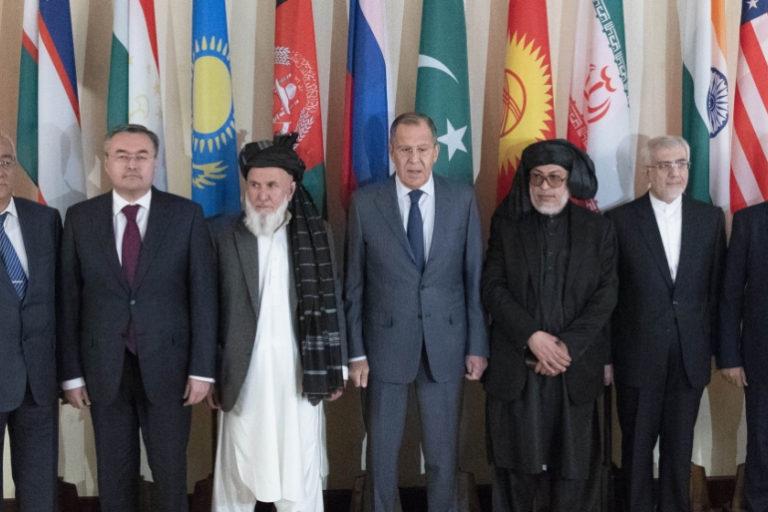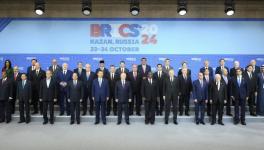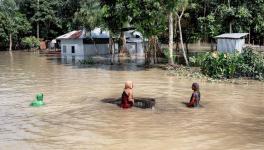India Reaches Out to Russia to Break Out of Regional Isolation over Afghanistan

Russian Foreign Minister Sergey Lavrov flanked by Taliban officials attending a conference on Afghanistan, Moscow, November 2018
The Indian establishment media hyped up Prime Minister Narendra Modi’s call with Russian President Vladimir Putin on August 24 in a desperate attempt to distract attention from Delhi’s abject isolation over the Afghanistan situation.
The desperation to clutch at any straw stems out of the complete breakdown of India’s Afghan policy. The government’s narrative on Afghanistan stands exposed as deeply flawed.
Putin has acceded to Modi’s request for establishing “a two-way channel for permanent consultations” on the Afghan issue. (here) Russia has always been open to such cooperation with India but Modi government prioritised India’s partnership with the US.
The spin doctors in Delhi have planted a story in the media that Putin will accord recognition to a Taliban government only in tandem with Modi. Putin also agreed, apparently, with Modi’s assessment that Pakistan will exploit the Taliban’s ascendance in Kabul to fuel terrorism in the region. read more
This is clearly a case of spin going overboard. Indian officials may have seriously embarrassed the Kremlin by spreading canards even if the motive might have been to impress an all-party meeting with the opposition on Friday.
Moscow takes a ‘de-hyphenated’ approach toward relations with India and Pakistan. In the Russian calculus, Pakistan figures as a serious partner with the potential to help advance some of Russia’s core interests in the Eurasian region in a way that India never can or will, given its quasi-alliance with the US. This is one thing.
Second, India’s policies increasingly grate against Russia’s vital interests and core concerns. India is travelling in the Quad vehicle although that platform is a template of the US’ dual containment strategy toward China and Russia.
The Russian leadership at the highest level repeatedly cautioned Delhi that Moscow is unhappy with the US’ efforts to create a bloc of countries in the ‘Indo-Pacific’ to contain China and Russia. But Russia’s concerns not only fell on deaf ears but Modi government is openly ecstatic that the Quad is getting institutionalised with regular summit level meetings.
Now, despite the troubled history of Russia’s relations with Pakistan, Islamabad has been overly keen to foster close ties with Moscow. When it comes to Afghanistan, Pakistan unhesitatingly facilitated contacts between Russian and Taliban officials, which now stand Moscow in good stead.
Whereas Delhi remains transfixed on the dated notions that the Taliban is only a Pakistani proxy, Moscow sees the Taliban as an authentic Afghan entity with a legitimate role to play in that country’s mainstream politics. Thus, engagement with the Taliban is a centrepiece of Russia’s Afghan policy today.
Suffice to say, this contradiction cannot be glossed over even if Modi were to make half a dozen phone calls to Putin. Put differently, Russia will not be deterred on its tracks because Modi government has become a laggard on the Afghan question.
Interestingly, Putin had a call with Pakistan Prime Minister Imran Khan regarding the Afghan situation only a day after his conversation with Modi. The Russian readout shows a high degree of convergence between Moscow and Islamabad on the way forward in Afghanistan.
The readout says both leaders “stressed the importance of maintaining peace and security” in Afghanistan, “preventing violence and establishing an inter-Afghan dialogue that would facilitate the formation of an inclusive government that takes into account the interests of all segments of the population.”
Putin and Imran Khan “agreed to coordinate approaches to the Afghan issue both in bilateral and multilateral formats” and to “use the capabilities of the Shanghai Cooperation Organisation in ensuring regional stability and the fight against terrorism and the drug threat.”
The SCO being a code word of sorts for China’s regional role, this is a significant point of reference. (The readout on Modi-Putin conversation made no such reference to the SCO role in Afghanistan.)
The Russian readout concluded by underscoring that “Russian-Pakistani contacts at various levels will be intensified.” Clearly, the Kremlin attaches high importance to cooperation with Pakistan in the period ahead. Conceivably, Afghan reconstruction and the CPEC will open up huge opportunities for Russian business and industry.
Recent Chinese commentaries have flagged that “China’s close coordination and shared interests with Russia will also play a major role in potential rebuilding efforts in Afghanistan… In the Afghanistan situation, China and Russia have maintained close communication and have shared interests in peace and development in Afghanistan, which makes the two countries the main players and partners in Afghanistan’s rebuilding efforts, in stark contrast to the US’ intention to sow chaos in the country…”
“While China can play the leading role in carrying out specific projects with its building capabilities and funding sources, Russia can offer crucial support in such projects with its massive influence in both Afghanistan and the region in ensuring stability and security in the region. Experts said that China and Russia are among the countries that most sincerely want peace and development in Afghanistan, even as the US and some other Western countries continue to seek to undermine that.” read more
Yet another Chinese commentary this week entitled Afghan reconstruction may boost de-dollarization push wrote: “As the US seeks to impose sanctions against Afghanistan and stop much-needed global assistance to the country, the already-emerging global de-dollarization push could further accelerate with countries increasingly adopting alternatives to the US dollar… If Afghanistan’s reconstruction sets the stage for the increased presence and usage of other currencies like the euro and the yuan, the dollar’s status could be further diminished. In fact, the de-dollarization trend has already emerged in a number of countries and regions including Russia and Saudi Arabia.”
The flawed Indian policy toward Afghanistan is missing the woods for the trees. Modi government doesn’t have a “big picture”. Its zero-sum mindset is obsessed with rolling back the influence of China and Pakistan, its archetypal enemies, in Afghanistan. Whereas, all serious regional states are approaching the Afghan situation with a fulsome agenda of geoeconomics, especially Russia.
Delhi pinned high hopes on the US to rev up the great game in Afghanistan with an eye on Xinjiang and Pakistan, but, as it turned out, Washington dumped Delhi and began pursuing a renewed relationship with the Taliban.
Modi’s call with Putin was a desperate attempt to mitigate India’s regional isolation. Putin understood and played his part, while sequestering Russia’s deepening ties with Pakistan.
Get the latest reports & analysis with people's perspective on Protests, movements & deep analytical videos, discussions of the current affairs in your Telegram app. Subscribe to NewsClick's Telegram channel & get Real-Time updates on stories, as they get published on our website.























